Sunday July 23rd was a special day in many respects. Most obviously, it was Stephen’s birthday, and I could tell how excited he was to be able to celebrate it with his wife and his two youngest children, both of whom had been away in South America for most of the year, and in Jordan’s case, for part of 2016 as well. In honor, not so much of his birthday, but of his presence in Malawi, Stephen, or Abusa as he is often referred to in Malawi (which means Pastor in Chichewa), had been asked to give the sermon at the church where we would be attending worship. 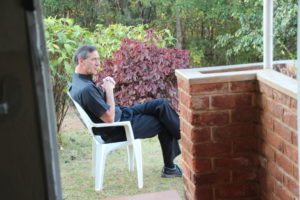
But there was a much more immediate and even more poignant reason that Sunday was a special day. Sunday offered Ethan Rhoad the chance to visit the classrooms at Sakata School that his grandfather Ed had built in memory of his late wife Ruth, Ethan’s grandmother. As Ethan stepped out of the Landcruiser and admired the beautiful new classroom that his “Poppop” had built last summer, and then looked at the plaque that dedicated the rooms to his grandmother, I could see his emotions pulling him in so many different directions.
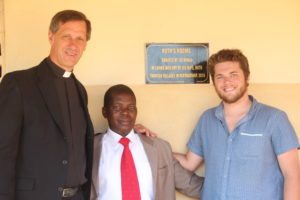
It is not my place, nor within my power as a writer, to accurately describe how Ethan felt at that moment, so rather than try, I will let Ethan explain it himself:
“Nine years ago I traveled to Malawi with my dad and Poppop to visit the Heinzel-Nelson family who were living there for a year. We didn’t know at the time how much this would impact our lives. Soon after we got back from Africa my Nana got sick. She had Lewy Body Dementia, a disease that makes the person lose their memories and experience hallucinations. For the next 5 years she suffered from this and could not remember and was not always aware as to what was going on. In the fall of my freshman year of college she passed away, leaving a large hole in our family that cannot be filled. During the continued work in Malawi, my Poppop felt called to donate part of her life savings to build a school block in Sakata, the area we first visited on arrival in Malawi. The building was dedicated in her honor which is fitting because she was one of the smartest people I know. After working in Nkope, a different area in Malawi about 4 hours away, for the past two months I was finally able to get to Sakata and see the work that has been done. It was very emotional for me. My Nana was not aware of the work Villages in Partnership was doing in Malawi with my dad. She was too sick to realize when I graduated high school. She had passed away too soon to see me graduate from the same college she saw my dad and mom graduate from 30 years earlier. When I was in Sakata looking at that school I thought about all of this and wondered what her reaction would be. I’ll never know but I like to think she would be proud.”
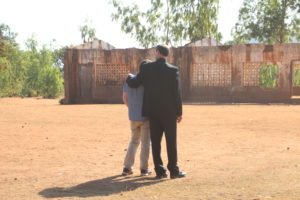
As we gave Ethan time to reflect, I thought about the Rhoad family, and what they meant to VIP, and more importantly to the people of Sakata. While most supporters of VIP know that we would not exist without the Heinzel-Nelson family, I think it equally true that VIP would not exist without the Rhoad family, certainly not in the same form that it exists today. And as I watched Stephen walk over to Ethan and put his arm around him to comfort him, in the midst of the school grounds that VIP was rebuilding, I was struck by how often the personal and the public seemed to intersect with VIP. I’m sure it may be true of all organizations, as we are all people, with our own unique stories and backgrounds, but every time we visited a project, or learned about a new initiative, I found an intensely personal story at its heart.
Soon it was time to leave Sakata School and to say goodbye to Ethan, who would be traveling back to Lake Malawi to continue his service as a medic and wound care specialist in the villages near Monkey Bay. As we watched Ethan disappear down the dusty road on the back of a bike taxi we headed off to church.
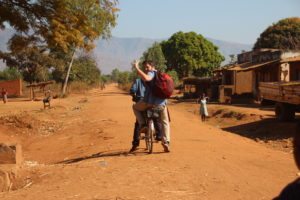
The service stretched beyond four hours again, as 5 choirs performed several songs before the congregation, including a VIP choir, for the first time highlighted by the talented Jordan Heinzel-Nelson and her violin, which her father had carried over for her earlier in the week.

After watching his youngest daughter with pride, it was soon time for the service’s other highlight, Stephen’s sermon. The charismatic and ebullient Daniel Bonongwe would be reprising his role as translator from the week before, dressed for the role in a bright red suit which Stephen told us, rather dubiously, had been given to him by the U.S. Ambassador to Malawi years ago.
Stephen began the sermon by mischievously telling the congregation what a special day it was, before revealing that it was his birthday, to which he received shouts of laughter and a round of applause from the assembled. Bonongwe then led the congregation in an impromptu, and rather ragged rendition of “Happy Birthday” in English. The lack of participation by the audience and the fact that Bonongwe chose an English song puzzled me, until after the service Liz reminded us that most villagers have no idea when they were born, so there are no Chichewa “Happy Birthday” songs, and often by extension, no birthdays, in the villages. After warming up the crowd Stephen launched into his sermon and I got the opportunity to see pastor and translator working as a perfect team. As Stephen descended from the pulpit to walk amidst the pews Bonongwe mirrored his every step and gesture. Every raise in Stephen’s voice was amplified by Bonongwe, every fall made more impactful, and every silence became heavier with significance. The congregation was on tenterhooks the entire sermon and gave Stephen and Bonongwe a near standing ovation when they had finished.
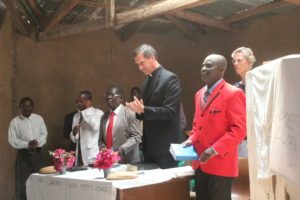
After the service was concluded the church thanked us for coming by graciously preparing for us a large meal of rice, pigeon peas and goat which we shared together with the church elders on the pews. After saying thank you and our goodbyes it was time to head back to the farm to change into hiking clothes for our walk on top of Zomba Plateau in celebration of Stephen’s birthday. I was so excited to finally get the chance to go on top of Zomba. We had climbed the foothills on my second day in Malawi, but since then I had only had the chance to gaze up at the enormous massif, which so dominated the surrounding area that it served as the constant backdrop to everything we did in the villages. On our first day together, Jordan had shown me the giant face that the wind and rain had carved into the rock, and every time I looked up I couldn’t help but see the rather tragic face, starting unblinkingly into the blue Malawian sky. But despite its ubiquity, I had not grown tired of the plateau, if anything its ceaseless presence had only sparked my curiosity and desire to find out what lay on top of its sprawling hills.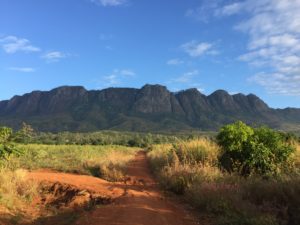
We packed into the Landcruiser and started the long drive to the top. As we reached the road that wound its way up the face of the plateau, passing the former presidential palace, I noticed the changes in the local geography. Trees were becoming more common as were grasses, and small flowering plants and bushes. The air was lighter and cooler and I could feel the dust of the village roads that had clung to my skin and clothes being swept away by the streams of air rushing past our open windows. As the road climbed higher and became steeper and steeper, cut backs and blind turns became more common and I was impressed that Liz was able to stay to the road while at the same time sizing up which of the local fruit vendors dotting the roadside we would stop at. We found a likely looking group and bought fresh raspberries, strawberries and gooseberries that they had picked from the wild bushes that grew in abundance on the verdant hillsides. Finally we reached a small parking area near a former government fish pond and jumped out of the Landcruiser.
As we reached the path that we were going to take, which lay in a valley enclosed by the outer hills of the plateau, I was amazed by how green everything was.
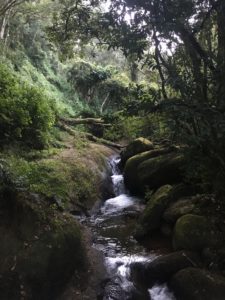
It was the dry season, and in the villages everything was covered in layers of the fine red dust that jumped from the roads every time a car, bike or cart went rumbling past. The only sign of green that I had seen in the previous two weeks was when we visited the rare fields that were irrigated and were growing winter crops. As the path continued up I heard the rushing of water and we soon met up with a large stream that was making its swift way down the mountain. Zomba is covered in these small streams that bubble up from mountain springs and leap down the mountain in cascades and waterfalls.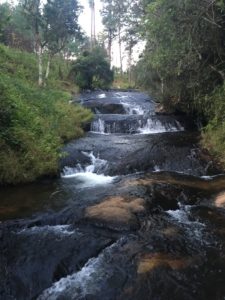
The sun had already sunk below the hills above us, and the soft blue light that surrounded us made it seem as if we we were walking through an otherworldly land of eternal twilight. As we gazed in wonder at the moss covered trees towering above us I suddenly felt as if I had been transported thousands of miles away to the heart of the Congo. I couldn’t believe that we were in the same country anymore. As we passed by a beautiful waterfall and the large pool at its base, Stephen and Liz told us about the time that they had brought a group on this hike and had unknowingly walked through a colony of army ants. The ants had secretly made their way up the legs of the group members and waited until they were all in position. All at once, as if the ants were waiting for the perfect moment to act in unison, a signal had been given, most likely through pheromones, and the ants all began to bite. The group began screaming and itching themselves like mad, and it had gotten so bad that they had to take off their outer garments and jump into the pools to get the ants off. Stephen told us this just as we passed the spots where he guessed the ant colony lay, and sure enough a few minutes later, Jordan and I both experienced sharp pains on our legs as the fierce ants began to bite. Luckily the ordeal of the earlier group had made us more careful and only a few isolated ants had latched their way on to me and Jordan and we were able to continue the walk pain free a few minutes later.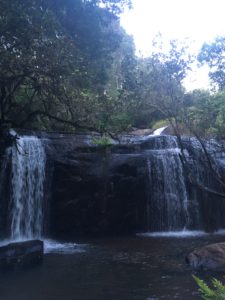
All too soon it was after 5 o’clock and it was time to turn around unless we wanted to risk losing our footing or our way in the swiftly falling dark. But as beautiful as the plateau was, as we made our way down we encountered signs that it might not always remain so. Coming down the main road the trees to our right suddenly disappeared, and we found ourselves next to a barren field that had been completely clear cut and burned. It was a reminder that there were tens of thousands of people living in the shadow of the plateau that needed firewood for burning and arable land for farming, and that unless Malawi was able to solve its pressing environmental issues even this beautiful refuge would not remain for long.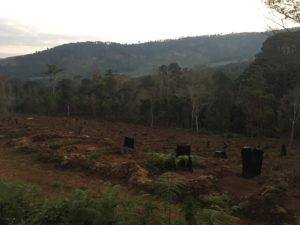
After a beautiful birthday dinner at a hotel on top of the plateau we got once more into the Landcruiser and made our way down the winding road where hours before we had bought the berries. The road was dark now and empty but suddenly we reached a break in the trees to our left and we had an unobstructed view of the land below. It was a sight I will never forget. Just below us were the lights and cars of Zomba city, and the fortunate few who had access to electricity and power. But after a few hundred meters the lights abruptly ended and there was nothing to be seen for miles and miles, all the way to the horizon, but inky blackness. I suddenly felt as if I were on top of a cliff above a tiny seaside village, looking out at the open ocean, too dark and mysterious to reflect the pale moonlight. But I knew that we were nowhere near the sea, and that tens of thousands, perhaps even hundreds of thousands, of people lived in the blackness stretching out before me. As a teacher I had always kept a satellite map of the world at night on the wall in the back of my classroom. And I would often point to the blaze of light along the north-east seaboard of the United States, a blaze far brighter and more intense than any other on the map, to remind my students how fortunate we all were. We had been born in the richest part, of the richest country in the history of the earth. And then I would point to sub-Saharan Africa, which other than a few isolated pockets of faint light, was completely dark. This was energy poverty I would tell them. As I gazed down from Zomba Plateau that night, I wished my students could have been there to see, to understand in a visceral way that I was never quite able to explain, what energy poverty was. To see thousands of people living in darkness, unable to do even the simplest tasks once night has fallen, because luck or fate or whatever you wanted to call it, had determined that they would be born in a poor country.
As I gazed down from Zomba Plateau that night, I wished my students could have been there to see, to understand in a visceral way that I was never quite able to explain, what energy poverty was. To see thousands of people living in darkness, unable to do even the simplest tasks once night has fallen, because luck or fate or whatever you wanted to call it, had determined that they would be born in a poor country.
I was silent the rest of the drive home as I wrestled with the fact that our beautiful day had been an anomaly. Most Malawians would never be able to do any of the things that we had done. And our day would remain an anomaly, indeed days like ours might vanish altogether, unless we continued to work with the people of Malawi to bring change and light to their country.

all i can say is WOW thank you so much for writing these daily blogs. makes me feel like i a right there.